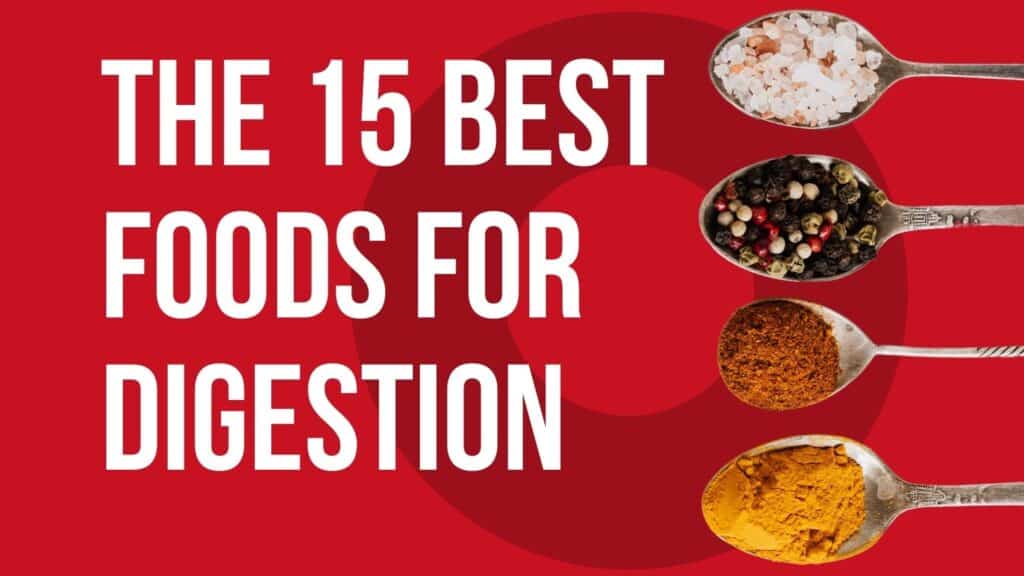
The 15 Best Foods For Digestion
Digestion is the breakdown of food into nutrients. The nutrients in food are required by the body for energy, growth, and tissue repair. When your digestive tract malfunctions, whether due to overeating or consuming foods that are not good for you, you must reread the guidelines of healthy nutrition.
There are several reasons why you may have stomach pain from time to time. Digestive disorders can affect millions of individuals worldwide, ranging from mild gastrointestinal infections to dietary intolerances to more serious illnesses.
Fortunately, because food must travel through your digestive tract, several foods can benefit your gut along the process. Some foods, such as vegetables and yogurt, can improve the digestive process. These excellent foods for digestion, which can be found in most grocery shops, are both comforting and delicious.
Here are the top 15 foods for improving digestion.
Yogurt:
Yogurt is manufactured from fermented milk, often by lactic acid bacteria. It contains probiotics, which are friendly bacteria that inhabit your digestive system and can assist improve digestion while keeping your gut healthy.
While probiotics exist naturally in your stomach, increasing your consumption of foods like yogurt can help with digestion. Probiotics can benefit the treatment of digestive disorders such as bloating, constipation, and diarrhea. They can improve lactose or milk sugar digestion.
Lean Proteins:
People with IBS or gastrointestinal sensitivity should consume lean proteins and avoid high-fat diets, such as fried items.
High-fat diets can cause intestinal contractions, and the high-fat content of red meat is only one reason to pick healthier alternatives. According to experts, red meat increases intestinal bacteria that create chemicals linked to an increased risk of blocked arteries.
Papaya:
The lush tropical fruit papaya includes papain, a digestive enzyme. It promotes digestion by facilitating the breakdown of protein fibers. While it is not necessary for your diet, it might help with protein digestion.
Papain may also help with irritable bowel syndrome (IBS) symptoms including constipation and bloating. Because of its digestive properties, it is frequently used as the primary enzyme in digestive supplements.
Turmeric:
Turmeric is a powerful anti-inflammatory and anti-cancer spice that you should keep on hand. Curcumin, one of its key ingredients, can help maintain the gut lining, affect the gut flora, and shows potential as a therapy for various gastric problems such as inflammatory bowel disease and colorectal cancer.
Whole Grains:
Grains are the seeds of grassy plants known as cereals. To be considered a whole grain, it must include the entire kernel, including the bran, germ, and endosperm.
Whole grains high in fiber include oats, quinoa, farro, and whole wheat products. Fiber present in these grains can aid digestion in two ways.
- First, fiber adds bulk to your stool and can benefit constipation.
- Second, certain grain fibers serve as prebiotics, feeding good microorganisms in your stomach.
Ginger:
Another beneficial food for digestion and a popular natural digestive remedy among pregnant women, ginger is a traditional Asian treatment for stomach pains and nausea and a favorite condiment in Japanese cuisine.
Ginger appears to speed up the passage of food through your stomach, alleviating some of the adverse effects associated with poor digestion. It has also been used to relieve nausea, such as morning sickness in pregnancy.
Salmon:
Salmon is high in omega-3 fatty acids, which can help decrease inflammation in the body.
Gut inflammation is prevalent in individuals who are suffering from inflammatory bowel disease, food intolerances, and other digestive disorders.Omega-3 fatty acids may assist in reducing inflammation and thereby improving digestion.
Sweet Potatoes:
Who doesn’t like them? They are tasty root vegetables high in Vitamin A, a substance important for maintaining and restoring the intestinal barrier as well as promoting a healthy immune system.
Sweet potatoes contain anthocyanins, a kind of antioxidant that may play an essential role in colon cancer prevention.
Applesauce:
Apples are high in nutrients, most notably polyphenols, which have anti-cancer and gut-protective qualities.
They also include digestive-enhancing soluble and insoluble fiber, and research suggests that these fibers, particularly pectin, contribute to the production of healthy bacteria in the colon. Cooking and mixing apples into applesauce makes it much simpler to digest these fibers.
Kefir:
Kefir is a cultured dairy product prepared by combining milk with kefir “grains.” These “grains” appear to offer digestive advantages as they are created by combining yeast and bacteria with milk.
Kefir’s cultures, like the probiotics in yogurt, help in lactose digestion, reducing some of the severe side effects associated with lactose intolerance, such as bloating, cramps, and gas.
Mushrooms:
Mushrooms should be included in your diet because of their anti-cancer qualities, energy-boosting B vitamins, Vitamin D, and fiber for gut health.
They also include beta-glucans, which are immune-boosting and regulating polysaccharides, as well as anti-inflammatory chemicals and zinc, which boost the function of the intestinal barrier (zinc deficiencies may also lead to gastrointestinal diseases). Mushrooms, as an added advantage, are a food that can be grown indoors.
Chia Seeds:
Chia seeds are high in fiber, which allows them to produce a gelatin-like material in your stomach when digested.
They function as a prebiotic, promoting the growth of beneficial bacteria in your stomach and so improving digestion. Their high fiber content promotes intestinal regularity.
Pineapple:
Bromelain, a substance found in pineapple, improves protein digestion, reducing indigestion and acid reflux.
It also reduces inflammation and pain, and it can help with diarrhea caused by infections such as E. coli. Pineapple may be eaten on its own or blended into an anti-inflammatory smoothie or smoothie bowl.
Fennel:
Fennel, a plant with a pale bulb and long green stalks, is used in cooking to add taste. Fennel also has an antispasmodic ingredient, which relaxes the smooth muscles in your digestive tract. It can alleviate unpleasant digestion symptoms such as bloating, gas, and cramps.
Beets:
The nutrients in beetroot can improve digestion by feeding friendly gut bacteria and adding bulk to your stool.
References:
- “5 Foods To Improve Your Digestion”. Retrieved from Hopkinsmedicine.org:
https://www.hopkinsmedicine.org/health/wellness-and-prevention/5-foods-to-improve-your-digestion
- “7 Superfoods That Help Digestion”. Retrieved from Everydayhealth.com:
https://www.everydayhealth.com/digestive-health-pictures/superfoods-that-help-digestion.aspx
- Medical News. “What Are The Best Foods To Aid Digestion?” Retrieved from Medicalnewstoday.com:
https://www.medicalnewstoday.com/articles/326596
- “Good Foods To Help Your Digestion”. Retrieved from Nhs.uk: https://www.nhs.uk/live-well/eat-well/digestive-health/good-foods-to-help-your-digestion/
- “The 9 Best Foods To Help Improve Digestion”. Retrieved from Eatingwell.com:
https://www.eatingwell.com/article/7909480/best-foods-for-digestion/


